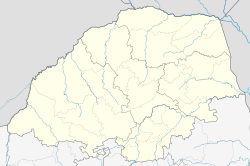Lenyenye
Lenyenye | |
|---|---|
 Lenyenye | |
| Coordinates: 23°58′19″S 30°16′08″E / 23.972°S 30.269°ECoordinates: 23°58′19″S 30°16′08″E / 23.972°S 30.269°E | |
| Country | South Africa |
| Province | Limpopo |
| District | Mopani |
| Municipality | Greater Tzaneen |
| Area | |
| • Total | 8.81 km2 (3.40 sq mi) |
| Population (2011)[1] | |
| • Total | 12,099 |
| • Density | 1,400/km2 (3,600/sq mi) |
| Racial makeup (2011) | |
| • Black African | 99.2% |
| • Coloured | 0.2% |
| • Indian/Asian | 0.3% |
| • White | 0.1% |
| • Other | 0.1% |
| First languages (2011) | |
| • | 87.8% |
| • Sotho | 70.8% |
| • Tsonga | 2.7% |
| • tshivenda | 0,70% |
| • Other | 5.2% |
| Time zone | UTC+2 (SAST) |
| Postal code (street) | 0857 |
| PO box | 0857 |
| Area code | 015 |
Lenyenye is a township in the Greater Tzaneen Local Municipality of the Mopani District Municipality in the Limpopo province of South Africa. It is located about 20 km southeast of the town of Tzaneen. It is the home of Bakgaga or Bakhaga in the language of sekhaga they call themselves that . the neighbouring township of Nkowankowa lies directly north of Lenyenye. The prominent language that is spoken there is Sekhaga or Sekgaga sa maake
The township is best known as the place where the academic/politician Mamphela Ramphele was banished to under the apartheid regime and lived during the period from 1977 to 1984.
References[]
- ^ a b c d "Main Place Lenyenye". Census 2011.
Categories:
- Populated places in the Greater Tzaneen Local Municipality
- Limpopo geography stubs


